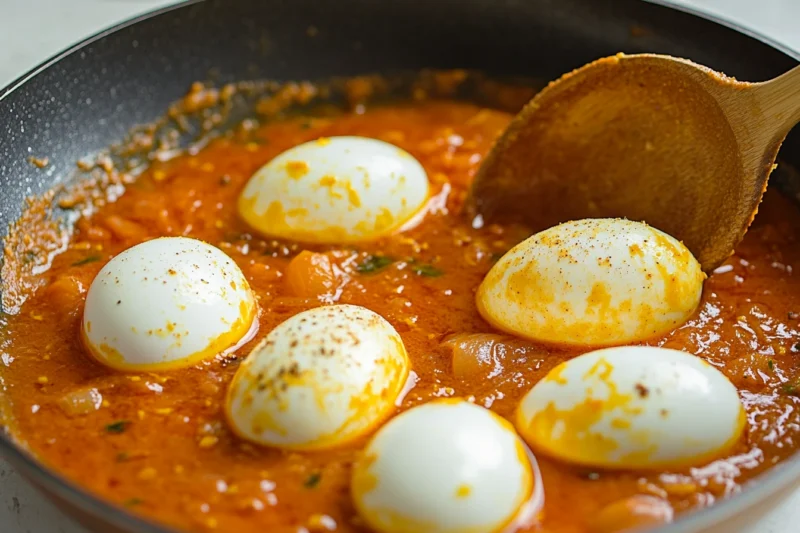Egg curry Recipe can be described as a delicious and hearty meal that has captured the hearts of foodies worldwide. With tender eggs and the rich, spicy tomato-based sauce, This recipe is ideal for potlucks, family dinners, or even a simple evening meal. The rich, fragrant curry, rice naan, or even crusty bread are delicious. Whether you’re brand new to egg curries or a veteran foodie, this recipe provides easy steps and a variety of variations to meet your preferences.
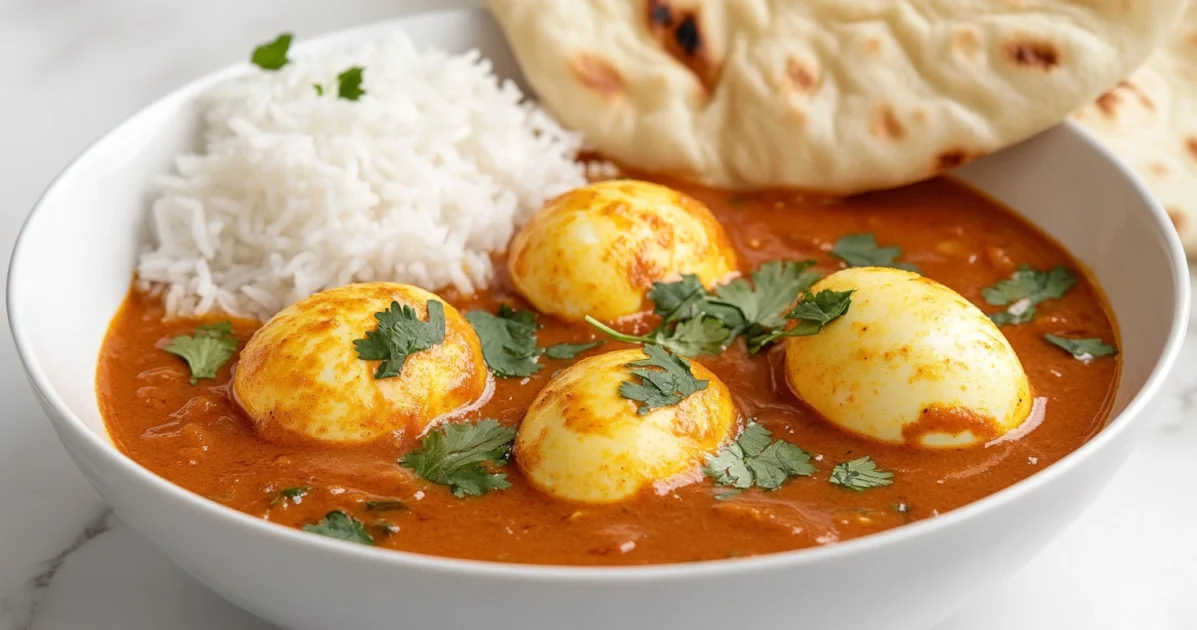
Egg curries are especially popular in South Asian cuisine. Still, they’ve found an appearance in kitchens around the globe because of their ease of preparation and versatility.
Table of Contents
Ingredients for Egg Curry
The appeal of egg curry is in its simple ingredients. Most ingredients are staples in the pantry, making it a simple recipe. What you’ll need:
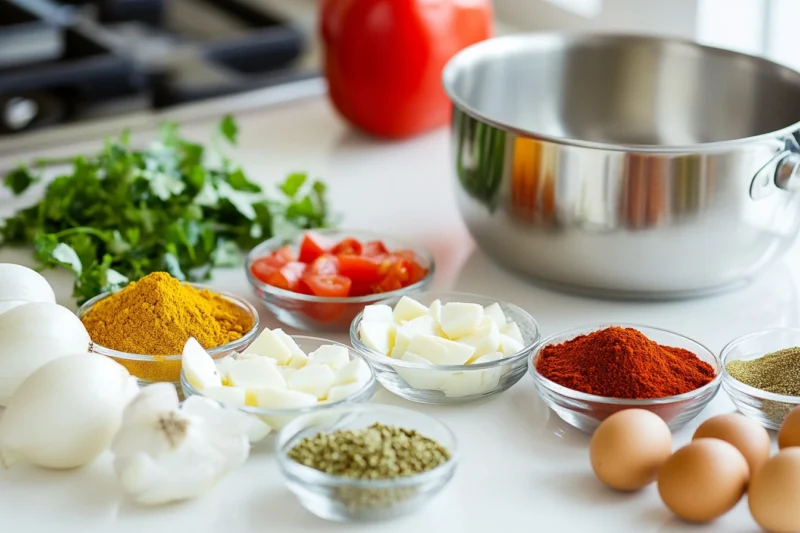
- 4 boiled eggs, peeled
- 2 tbsp vegetable oil
- 1 medium onion, finely chopped
- 2 medium tomatoes, pureed
- 1 tsp ginger-garlic paste
- 1/2 tsp turmeric powder
- 1 tsp chili powder (adjust to taste)
- 1 tsp ground coriander
- 1/2 tsp garam masala
- 1 cup water (or coconut milk for a creamier version)
- Salt to taste
- Fresh cilantro for garnish
Optional: Add green chilies for spice or replace water with stock for a more robust flavor. Mix in one tablespoon of yogurt or cream for a savory version before serving.
How to Make Egg Curry
Learn these simple steps and prepare an egg curry that tastes delicious without difficulty. Don’t be worried if you’re a novice to cooking curries. This method is easy to master and perfect for beginners!

- Prepare the base: Heat oil in a saucepan over medium-high heat. Add chopped onions and cook until golden brown. This process is crucial to developing a deep, delicious flavor.
- Add the spices: Stir in ginger-garlic paste and sauté for 1 minute. Add turmeric, chili powder, ground coriander, and garam masala. Cook until the spices release their aroma, about 2 minutes.
- Add the tomatoes: Pour the pureed tomatoes and cook until the oil separates from the mixture. This ensures the curry base is well-cooked and flavorful.
- Simmer the curry: Add water (or coconut milk), salt, and garam masala. Stir and let the curry simmer for 5 minutes, allowing the flavors to meld together.
- Add the eggs: Gently place the boiled eggs into the curry. You can score the eggs lightly with a knife to help them absorb the flavors. Simmer for another 5 minutes.
- Garnish and serve: Sprinkle with fresh cilantro and serve hot with steamed rice, naan, or paratha.
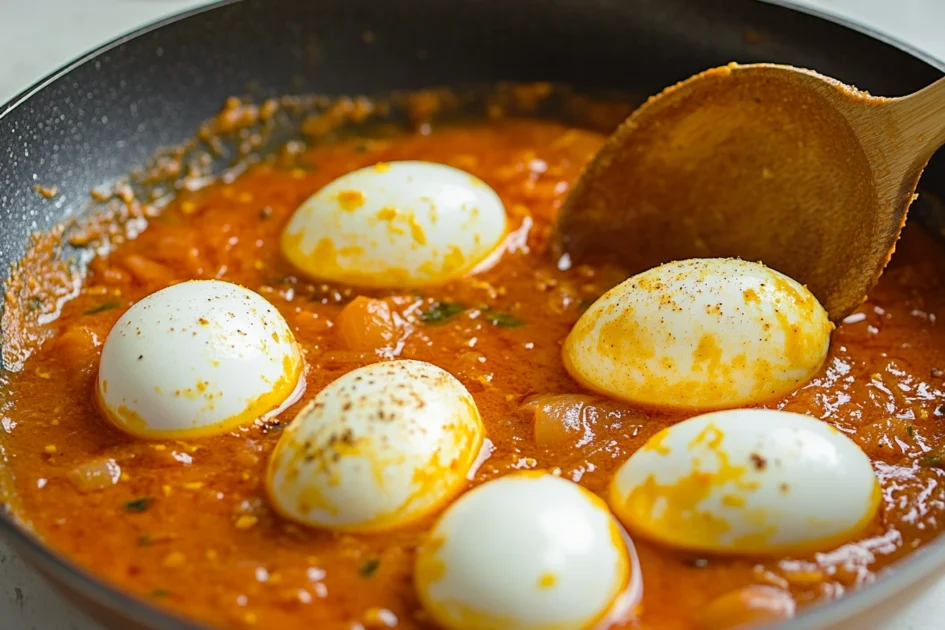
To add a twist, lightly fry the cooked eggs in oil before adding them to the curry.
Tips and Variations
Egg curry is highly versatile, and you can modify it according to your preferences. Here are some suggestions to personalize it:
| Tips | Variation |
|---|---|
| Make it creamy | Use coconut milk instead of water for a more decadent curry. A dollop of cream can also add luxurious texture. |
| Add veggies | Incorporate spinach, potatoes, or green peas for added texture and nutrition. For inspiration, check out spinach and egg recipes. |
| Spice it up | Add green chilies or cayenne pepper for extra heat, or try blending whole spices like cinnamon and cardamom for an aromatic twist. |
| Pair it with fried rice | For a satisfying meal, serve your egg curry with fried rice containing egg, chicken, and shrimp. |
| Try a tomato-spinach base | For a twist, create a base inspired by Hong Kong egg and tomato recipes. |
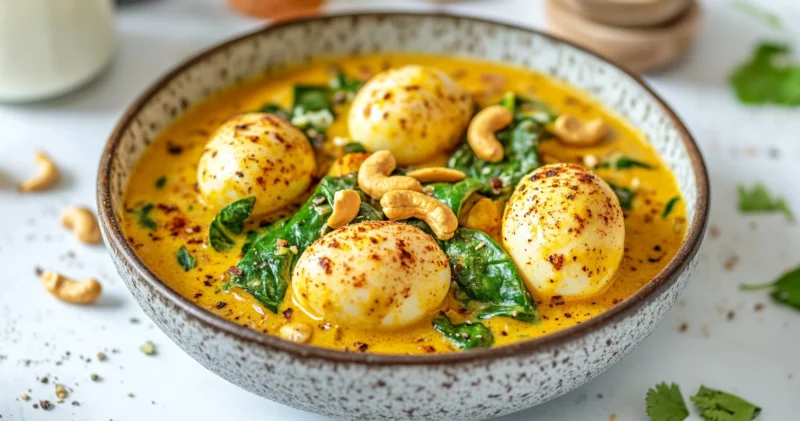
With these variations, egg curry becomes a dish that can be adapted for any occasion, whether a casual dinner or a festive gathering.
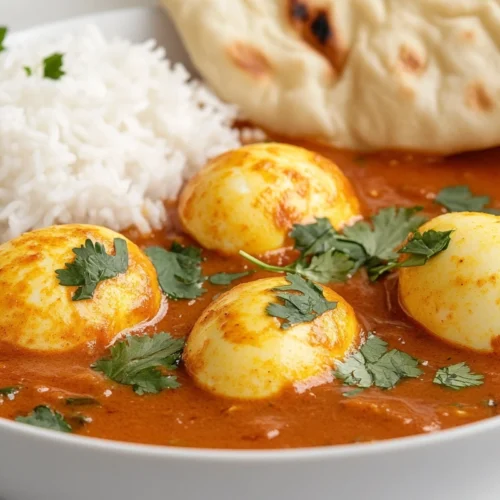
Egg Curry Recipe
Equipment
- 1 Skillet or pan
- 1 Wooden spoon
- 1 Measuring spoons
- 1 Knife and chopping board
Ingredients
- 4 boiled eggs, peeled
- 2 tbsp vegetable oil
- 1 medium onion, finely chopped
- medium tomatoes, pureed
- 1 tsp ginger-garlic paste
- 1/2 tsp turmeric powder
- 1 tsp chili powder adjust to taste
- 1 tsp ground coriander
- 1/2 tsp garam masala
- 1 cup water or coconut milk for creaminess
- Salt to taste
- Fresh cilantro for garnish
Instructions
- Prepare the base: Heat oil in a pan over medium heat. Add chopped onions and sauté until golden brown.
- Add the spices: Stir in ginger-garlic paste and sauté for 1 minute. Add turmeric, chili powder, and coriander powder. Cook until fragrant.
- Cook the tomatoes: Pour in the pureed tomatoes and simmer until the oil separates from the mixture.

- Simmer the curry: Add water or coconut milk, salt, and garam masala. Stir well and let the curry simmer for 5 minutes.
- Add the eggs: Gently place the boiled eggs into the curry. Simmer for another 5 minutes, letting the eggs absorb the flavors.

- Garnish and serve: Sprinkle with fresh cilantro and serve hot with rice, naan, or paratha.
Notes
- For a creamier curry, use coconut milk instead of water.
- Lightly fry the boiled eggs in oil before adding them to the curry for extra flavor.
- Adjust spice levels by adding green chilies or reducing chili powder.
Serving Suggestions
Egg curry goes well with many different sides. Here are some of the most popular choices:
- Steamed rice is a simple and classic dish that balances out the spicy flavor of curry.
- Paratha or Naan: The perfect dish to scoop up curry and enjoy each bite.
- Egg Biryani: Mix your curries with fragrant rice to create a luxurious, decadent one-pot dinner.
- Pickled vegetables: Add a tangy crunch to contrast the dish’s richness.
- Coconut rice: Enhance the tropical flavors of the curry by pairing it with coconut rice.
FAQs About Egg Curry
How long does curried egg last?
Curried egg dishes, including egg curry, can last up to 3-4 days when stored properly in the refrigerator. Use an airtight container to keep the flavors fresh and prevent contamination. If you’re reheating leftovers, add a splash of water or coconut milk to restore the curry’s consistency and avoid overcooking the eggs.
What does egg curry contain?
Egg curry typically contains boiled eggs simmered in spiced tomatoes or onion-based gravy. Common ingredients include onions, tomatoes, garlic, ginger, and a blend of spices such as coriander and turmeric. Variations may include coconut milk for creaminess or additional ingredients like spinach, as seen in spinach and egg recipes, for extra texture and flavor.
What are the benefits of curried eggs?
Curried eggs aren’t just delicious, but they are also adaptable. They can be eaten as a separate dish along with rice or served with other dishes like naan and paratha. In addition, eggs are an extremely protein-rich food item, making egg curry a delicious meal choice. To add a unique variation, serve eggs cooked in curry on rice fried with egg or chicken and shrimp, making it a fusion meal.
How long can you keep egg curry in the fridge?
Egg curry can be kept in the fridge for up to 4 days. Store the flavors and texture in a sealed container and avoid leaving it at room temperature for more than 2 hours after cooking. If freezing the curry, separate the eggs from the gravy to maintain their texture upon reheating.
How do you thicken egg curry?
You can thicken egg curry by allowing the sauce to simmer longer, reducing the liquid naturally. Another method is to add ingredients like cashew paste, coconut cream, or yogurt to achieve a thicker and creamier consistency. A small amount of mashed potatoes or ground nuts can also work as a thickener for tomato-based curries.
What is the key ingredient in curry?
The key ingredient in curry depends on the style and region of the dish. For egg curry, the essential components are the boiled eggs and the spice blend that gives the curry its signature flavor. Garam masala, turmeric, and coriander are the most common spices. For a variation, consider drawing inspiration from Hong Kong egg and tomato recipes, emphasizing fresh tomatoes as a primary ingredient.
What is the secret to a good curry?
The secret of a delicious curry is in the balance of flavors and the proper cooking of the spices. Toasting whole or blooming ground spices in oil enhances their aroma and depth. Another tip is to cook the onion-tomato base thoroughly until the oil separates, which ensures the flavors are well-developed. Finally, letting the curry simmer allows all the ingredients to harmonize harmoniously.
What is the king of all curries?
The “king of all curries” is a subjective concept that varies based on the region and individual preference. In a variety of South Asian cuisines, dishes like chicken tikka masala or biryani curries are generally thought of as iconic. But egg curry has the honor of being a favorite due to its simplicity, versatility, and ability to adjust to different flavors and tastes, making it an excellent option for any curry enthusiast’s menu.
How did curry originate?
Curry first appeared in South Asia, where the term was used to describe foods that included spicy sauces. As time passed, curry recipes spread throughout the globe and evolved to incorporate regional ingredients and cooking techniques. For instance, In Southeast Asia, coconut milk is an essential ingredient. In contrast, in Hong Kong-style cuisines, tomatoes are often the main of the stage. Egg curry is an excellent example of this versatility, as it blends traditional cooking techniques with the appeal of eggs worldwide.
Conclusion
tasty Egg curry comforting dish that is easy to prepare and endlessly adaptable. With its bold flavor and smooth texture, it’s bound to become a staple in your collection. Combine it with your favorite side dishes, play with the different variations, and relish the perfect combination of spice and savoriness. Give it a try today and see how the rich, delicious flavors change your next dinner!
